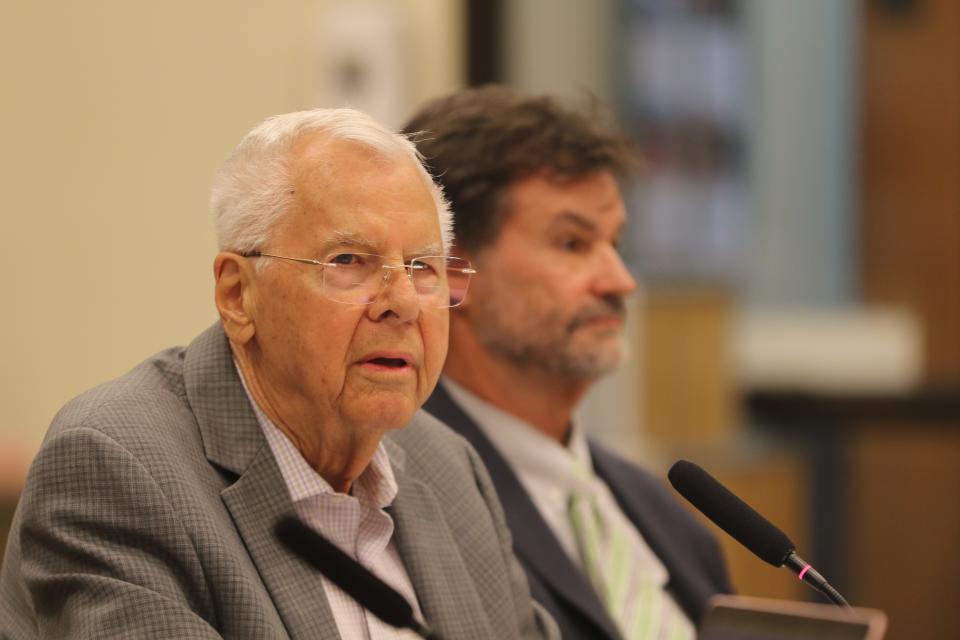'State consent' on nuclear stripped from Senate bill
- Oops!Something went wrong.Please try again later.
Wording that would have blocked a project to store spent nuclear fuel rods near Carlsbad and Hobbs was stripped from the U.S. Senate version of the appropriations bill being considered by Congress, despite its inclusion in the House of Representatives' legislation.
Holtec International proposed the project to hold up to 100,000 metric tons of the used fuel at the surface on a 1,000-acre property near the Eddy-Lea County line and received a license to build and operate last year from the Nuclear Regulatory Commission. That license was challenged during an ongoing lawsuit by environmental groups against the NRC, and oral arguments were held earlier this month by the U.S. Circuit Court for the District of Columbia which will rule at a later date.
Opponents of the project, concerned with the impacts the nuclear facility would have on nearby oil and gas and agriculture industries, lobbied for language in the budget bill to block any federal funds from going to such projects and require states provide expressed consent before a facility can be sited.
More: Holtec's New Mexico nuclear waste proposal questioned during federal court hearing
Along with Holtec, Interim Storage Partners received a license from the NRC in 2022 to build waste storage capabilities at an existing nuclear facility in Andrews, Texas. That license was vacated last year by a federal court. If passed into law, the language could restrict both nuclear fuel storage projects as bills were recently passed expressing opposition in both New Mexico's and Texas' state legislatures.
U.S. Sen. Martin Heinrich (D-NM) who frequently opposed the concept of consolidated interim storage in southeast New Mexico and West Texas and sits on the Senate Appropriations Committee said a deal could not be struck during this session to include the language related to state consent. He said he planned to work on additional legislation to address the issue.
“In this year’s appropriations bills, I fought to advance a consent-based siting process for consolidated interim storage,” Heinrich said in an emailed statement. “Although we did not reach a deal in this bill, I remain committed to passing a durable legislative solution that ensures we are appropriately managing our nation’s spent nuclear fuel.”

More: Renewable energy at nuclear waste site near Carlsbad? Here's how you can comment
John Heaton, co-chair of the Eddy Lea Energy Alliance (ELEA) applauded the removal of the language, arguing it could have stymied a national solution to nuclear reactor waste and thus impact the proliferation of nuclear power throughout the U.S. ELEA is a group of local government and business leaders from southeast New Mexico that provided the land and recruited Holtec to build the project.
Heaton said the Holtec facility is essential to expanded use of atomic power as a means of reducing carbon emissions from energy in New Mexico and the U.S. He said the energy source is critical to the state’s goal of 100 percent carbon-free electricity by 2045, as outlined in the 2019 Energy Transition Act.
“Without nuclear power, it’s really hard to lower carbon emissions,” Heaton said. “To have language to actively stifle nuclear power by not being able to address the back end of the fuel cycle makes no sense. Whether it’s a public or private entity, that kind of legislation that prevents the public sector from getting involved makes no sense.”

More: Aging infrastructure could pose risks at Waste Isolation Pilot Plant nuclear waste site
Oil and gas representatives worry nuclear project could risk fossil fuel development
Monica Perales, an attorney for Fasken Oil and Ranch, a Permian-basin oil company opposed to the project and which testified against it during the recent court hearing, said concerns are for the “incompatible land uses” posed by a nuclear waste facility alongside the oilfields of the basin.
The Permian Basin is the most active in the U.S., generating about 6 million barrels of oil per day in southeast New Mexico and West Texas. That industry also provides almost half of New Mexico’s state revenue, which could be at risk should a facility like Holtec’s go into operation, Perales said.
“We make up about half of New Mexico’s budget. We don’t want to jeopardize that. We have competing land uses here,” she said. “They want to bring in spent nuclear fuel and we think that puts the oil and gas industry at risk.”
More: US Senate OKs funding bill for New Mexicans impacted by Trinity Site
Perales said Fasken and the Permian Basin Coalition, a consortium of oil and gas companies and landowners in the region, felt “defeated” and betrayed by Heinrich’s apparent inability to see the language included. She said opposition to the storage Holtec proposed was bipartisan and roundly rejected by officials in both New Mexico and Texas.
“We collaborated on the draft and want the Senate Appropriations to be similar to the House Appropriations language so they can meet in the middle,” Perales said. “By no means are we backing down. We feel very disappointed and let down, but we’re not going to give up.”
Would Holtec's site be the final resting place for nuclear waste?
Like many other critics of the proposal, Perales argued that a permanent repository does not exist for disposal of the spent fuel, meaning the Holtec site could by default become the final resting place for the waste. It’s designed as a temporary storage site at the surface, and she said if the waste stays there long-term it could pose increased risks to the area, it’s people and businesses.
More: It's been a decade since the radiological release at WIPP. Here's what has happened since then.
“We’re opposing it as a state and local community that didn’t benefit from this waste and are now being forced to take the burden of storing it for God knows how long,” Perales said. “We have sufficient data to show the site does not qualify for the storage of spent nuclear fuel. It’s got to be single-use land. You can’t have storage of spent nuclear fuel within the proximity of mineral extraction. I’m just shocked that the NRC is working in a vacuum.”
But Heaton argued against viewing the used fuel rods as waste. He said the rods could be retrieved in the future from Holtec’s site and reprocessed for use in advanced nuclear reactors. Such a processing or reuse facility, Heaton said, could also be brought to southeast New Mexico to diversity its oil-dependent economy.
“There are many other options for that fuel,” Heaton said. “Burying spent fuel might not be the best option. Everybody recognizes used fuel is not absent of power that could be reused. It’s another economic development project that could come to our area. Those are job creators.”
Adrian Hedden can be reached at 575-628-5516, achedden@currentargus.com or @AdrianHedden on the social media platform X.
This article originally appeared on Carlsbad Current-Argus: No state consent on nuclear in new Senate appropriation bill

